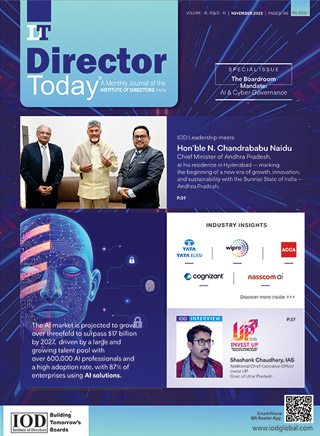Editorial - Women Leading the Way in the Boardrooms

The corporate world has recently witnessed a significant shift towards gender diversity, with women increasingly occupying leadership roles on boards and in executive positions. This transformation is evident both globally and within India, reflecting a growing recognition of the value that diverse perspectives bring to business leadership. Women have earned their position through knowledge, determination and not through reservation.
As of 2024, women hold 44.7% of board positions in FTSE 100 companies, a notable increase from 42.6% the previous year, highlights The Guardian Report on ‘Women in the Boardroom’. If this percentage is converted into absolute numbers, the result would be much more pronounced. This upward trend is mirrored across FTSE 350 companies, where female board representation has reached an all-time high of 43.4%.
The UK now ranks second internationally for women in the boardroom, just behind France, which boasts a 45.4% female representation, achieved through the implementation of quotas. Despite this progress, the number of female chief executives in the FTSE 350 has slightly decreased from 20 to 19, underscoring the need for continued efforts to elevate women into top executive roles. Moreover, just 52 companies in the S&P 500 and 25 in the Euronext 100 have female executive directors, highlighting the global challenge of achieving gender equality in senior leadership. A recent research by Reuters indicates that companies with higher female representation in senior roles tend to be more profitable and socially responsible. However, barriers such as gender bias, childcare costs, and workplace culture continue to hinder women's advancement, particularly at mid-career levels when they often face maternity leave and caregiving responsibilities. Addressing these challenges requires equitable policies, normalization of parental leave for both parents, visible support from senior leaders, and affordable childcare solutions. Nordic countries, renowned for their gender equality, exemplify effective strategies like shared parental leave and pay transparency, which have been instrumental in promoting women's leadership.
India has made commendable strides in enhancing female representation in corporate leadership. The Companies Act, 2013 marked a turning point by mandating the inclusion of at least one woman director on the boards of listed companies. This legislative push has led to women holding 17% of board positions in corporate India. Notably, approximately 23% of large company boards in India now have at least three women, a significant rise from 10% in 2018. Additionally, SEBI's 2018 mandate requiring the top 1,000 listed companies to have at least one woman independent director has contributed to a positive shift in governance practices. The number of women directors rose to 200, with 73.5% being independent in FY24.
While these figures highlight progress, the journey towards true gender parity remains ongoing. In 2022, women occupied only 16% of senior & middle management roles in India, highlighting a persistent gap between board representation and executive positions. Only 1.6% in Fortune 500 companies, and just 3.2% in Fortune 1,000 are led by women MD/ CEOs. In the Next 500, a ranking of emerging companies, this figure rises to 5%.
To bridge this divide, expanding board sizes and creating additional seats specifically for women have been suggested as viable strategies. Moreover, industries such as professional services, healthcare, and education lead with higher female representation in leadership, while sectors like construction, oil and gas, mining, and utilities lag behind for their nature of process and operations where physical work and round the clock requirements remain unchanged, indicates a recent report by LinkedIn India. The initiative of TATA Motors to run one of the plants only by women employees may prove to be an example for other industries. This disparity underscores the need for targeted efforts to achieve gender parity across all industries within the Indian economy.
To sustain and accelerate this momentum, organizations must continue to dismantle cultural and structural barriers impeding women's progress. This includes implementing equitable workplace policies, fostering inclusive cultures, and ensuring visible commitment from senior leadership to champion gender diversity.
By embracing these measures, the corporate sector can unlock the full potential of women leaders, driving innovation, profitability, and societal advancement.As we commemorate International Women's Day, on March 8, this Special March 2025 Issue of Director Today celebrates Diversity, Equity, and Inclusion (DEI). Recognizing that inclusive workplaces lead to stronger corporate governance and better decision-making, the Institute of Directors recently hosted a special session on 'Engaging Employees in DEI-Focused CSR Programs to Strengthen Organizational Culture' at the IOD's 19th International Conference on CSR during February 06 - 07, 2025. This convention highlighted the importance of workforce culture and diversity at the workplace and in boardrooms, reinforcing the critical role women play in shaping the future of corporate leadership.
The road ahead is promising, and with collective efforts, gender parity in leadership is not just an aspiration - it is an achievable reality.
Looking ahead, we are pleased to announce that Institute of Directors will be hosting the 2025 Annual UAE Global Convention during April 22 - 25, 2025, on the Theme: 'Boards in a Rapidly Changing World: Innovative Strategies for Resilience and Sustainability.' This event will bring together thought leaders, policymakers, and industry experts to explore the evolving role of boards in navigating today's dynamic corporate landscape. Our members have an opportunity to network with international experts.
Author

Pradeep Chaturvedi
Vice President - Institute of Directors
He is former Advisor FAO & former Chairman, Institution of Engineers, Delhi. He is a Mechanical Engineer & has been involved with Environment & Energy Policy (planning & implementation) of energy projects under the UN Agencies for over three decades in India & other Asian and Pacific countries. He is Vice-President, World Environment Foundation & Institute of Directors, India.
Owned by: Institute of Directors, India
Disclaimer: The opinions expressed in the articles/ stories are the personal opinions of the author. IOD/ Editor is not responsible for the accuracy, completeness, suitability, or validity of any information in those articles. The information, facts or opinions expressed in the articles/ speeches do not reflect the views of IOD/ Editor and IOD/ Editor does not assume any responsibility or liability for the same.

 Quick Links
Quick Links
 Connect us
Connect us




 Back to Home
Back to Home






























